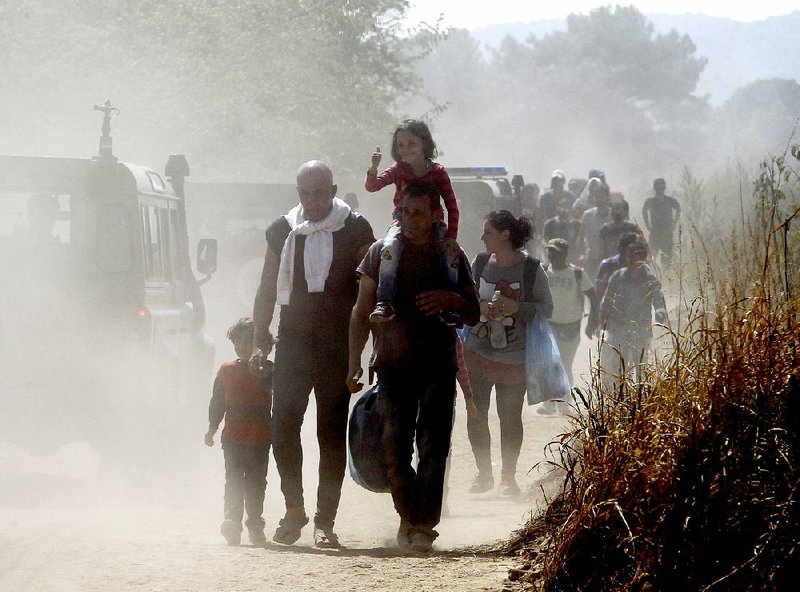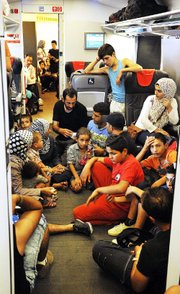GENEVA -- European countries such as Hungary that have blocked migrants from traveling by train "push them right into the hands of smugglers," with potentially deadly consequences, the head of the International Organization for Migration said Monday.
Director General William Lacy Swing lamented a "fear factor" espoused by some politicians, who he said overlook the benefits that migrants can provide.
Swing, a longtime U.S. diplomat, said his 157-member intergovernmental body, which often partners with U.N. agencies, is ready to better help the European Union manage an influx of more than 320,000 migrants to European shores this year.
The migration group will put up some of its own money, Swing said, but aid groups overall "need the support of the governments to say, 'We need your help.'"
European Council President Donald Tusk rejected criticism of how Europe has handled the crisis, and he promised further measures to deal with the problem.
After meeting Monday with Slovenian Prime Minister Miro Cerar, Tusk said, "Europe cannot be blamed for the migration crisis." But he acknowledged that the EU needs to do more "to alleviate the unbearable human suffering and tragedies that have become everyday news."
"The migrant crisis will remain a key issue for Europe in the years to come," Tusk said. Cerar noted that "nobody could have imagined that this issue would grow so large."
The influx of migrants has posed a challenge for several countries including, Greece, Serbia, Macedonia and Austria. On Monday, Austria stepped up vehicle inspections at its Hungarian border, creating a huge traffic jam on the main Budapest-Vienna highway.
The inspections were in response to the deaths last week of 71 migrants who apparently suffocated in a truck.
In addition to the gridlock at the Hegyeshalom border crossing, which at its peak became an 18-mile backup, traffic was slower than usual at other spots along the Hungary-Austria border, according to the traffic-monitoring company Utinform.
Traffic appeared to be flowing smoothly by late afternoon, and Austrian Interior Ministry spokesman Karl-Heinz Grundboeck said inspectors would continue to conduct "spot checks" of vehicles at all main border crossings.
At Budapest's Keleti train terminal, meanwhile, hundreds of migrants, many saying they were from Syria, boarded trains headed west to Austria and Germany, without apparent police intervention.
In past months, Hungarian police, sometimes acting with colleagues from Germany and Austria, often removed migrants who didn't have the necessary travel documents.
On Monday afternoon, there were long lines of people at the Budapest terminal's ticket windows.
Two of the express trains that left Budapest, however, were stranded on the border after Austrian Federal Railways refused to allow them to proceed into the country, citing "overcrowding." Austrian police spokesman Roman Hahslinger said some of those on the trains disembarked and continued into Austria on regional trains.
Swing expressed concern that government policies, such as restricting migrants' use of trains, would drive migrants to consider dangerous options.
"If you deny them, although they have a paid ticket and you don't let them to get on board, you push them right into the hands of smugglers," Swing said, alluding to the migrants found dead in Austria. "So they get into vans and into trucks, and they die."
Swing urged governments to ease restrictions on migrants' movements, improve reception centers and ensure safe, legal means of travel.
Hungarian government spokesman Zoltan Kovacs stressed that his country was protecting external EU borders -- not just its own.
"If we do not succeed in restoring order and legality here, illegal migration -- including that of refugees, who are truly in need of protection -- will become completely unmanageable," he said. The influx of tens or hundreds of thousands of people "illegally ... is unacceptable," he said.
About 160,000 migrants have been detained already this year in Hungary, more than three times the figure recorded in all of 2014. Many apply for asylum but quickly leave for richer EU countries such as Germany and Austria before their requests are decided.
German Chancellor Angela Merkel has praised some of Hungary's efforts, saying it has registered refugees "very thoroughly."
But EU governments say more needs to be done. Germany, France and Britain are seeking better processing of people arriving in Italy and Greece -- the main landing spots in the EU for migrants fleeing violence, poverty or persecution.
French Prime Minister Manuel Valls said Monday that firmness must accompany humanity in dealing with the crisis, as officials announced plans for a new refugee center in Calais, where thousands of migrants have gathered in hopes of sneaking across the English Channel to Britain.
The humanitarian aid center, partially funded by the EU, is expected to open by early next year.
"The responsibility of us all is to make sure the right to asylum ... is respected everywhere. One cannot avoid it with barbed wire," Valls said at a news conference in Calais. But, he said, migration by people seeking to escape poverty "must be combated."
He tried to dissuade migrants from journeying to Calais, where the Eurotunnel and port have bolstered security.
"Coming to Calais is throwing oneself into an impasse," Valls said.
Elsewhere in Europe, the flow of asylum-seekers from Syria and the Mediterranean region have found an unlikely route: through Russia to a remote Arctic border post in Norway.
Police Chief Inspector Goeran Stenseth said Monday that 151 people have crossed the border this year near the northeastern Norwegian town of Kirkenes, about 1,550 miles northeast of Oslo.
He said most of the migrants are from Syria, with some from Turkey and Ukraine. He said they mainly cross in vehicles but that some have resorted to arriving on bicycles because the Storskog border post is not open to pedestrians.
"There have been about 100 during the past two months, at least 50 in July, and looks like August will be much the same," he said. "But the conditions will be bad soon. It's getting colder by the day. ... Soon no one will be able to bike, that's for sure."
Russians often send the asylum-seekers over the border, raising the possibility that the route has been organized and could be classified as human trafficking.
"It's too early to say, but we are continuing to look into it and will talk to the Russian border officials about it, too," he said.
Information for this article was contributed by Jamey Keaten, Pablo Gorondi, Matti Huuhtanen and staff members of The Associated Press.
A Section on 09/01/2015


